Why you should see ‘The Stairs’
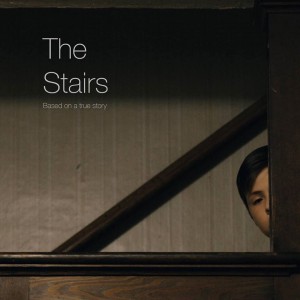 One of the films being screened at this year’s Fort Myers Film Festival is The Stairs. It depicts an elderly man who listens to a tape recording his father made prior to his death in which he describes his most horrific experience in Auschwitz during World War II.
One of the films being screened at this year’s Fort Myers Film Festival is The Stairs. It depicts an elderly man who listens to a tape recording his father made prior to his death in which he describes his most horrific experience in Auschwitz during World War II.
The film is a short, dense, multi-faceted story susceptible to multiple, sometimes conflicting interpretations. The film starts and ends with a flashback to a night when the man, then a 10-year-old child, sat at the top of the stairs 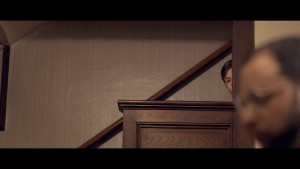 eavesdropping on his parents’ conversation with a couple they’d invited over for the evening. It’s a cinematic device that gives the audience a nostalgic point of entry into the terrible story his father tells about how he was spared from being gassed on the day of his arrival at Auschwitz. Most people have had the
eavesdropping on his parents’ conversation with a couple they’d invited over for the evening. It’s a cinematic device that gives the audience a nostalgic point of entry into the terrible story his father tells about how he was spared from being gassed on the day of his arrival at Auschwitz. Most people have had the 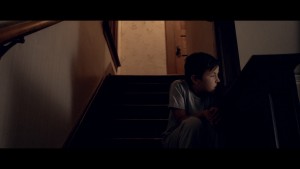 experience of listening in when their parents have company over – whether it’s from the top of the stairs, the hallway around the corner or some other vantage where discovery is unlikely. And so, like that wide-eyed 10-year-old at the top of the stairs, we too find ourselves leaning forward and straining to hear the broken
experience of listening in when their parents have company over – whether it’s from the top of the stairs, the hallway around the corner or some other vantage where discovery is unlikely. And so, like that wide-eyed 10-year-old at the top of the stairs, we too find ourselves leaning forward and straining to hear the broken 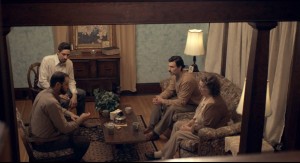 cadence of the story his father now tells.
cadence of the story his father now tells.
This is important, even crucial, since most viewers have no first-hand memory of the Holocaust. True, some Millennials, Gen-Xers and Baby Boomers have met one or more Holocaust survivors. But their stories seem surreal. After all, when you hear that 6 million Jews 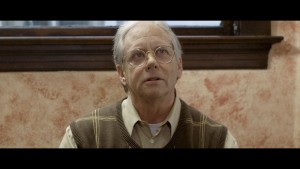 perished during the Shoah, the number comes across as little more than a cold, almost meaningless abstraction. In fact, the very man who carried out Hitler’s Final Solution to the Jewish Problem understood this reality.
perished during the Shoah, the number comes across as little more than a cold, almost meaningless abstraction. In fact, the very man who carried out Hitler’s Final Solution to the Jewish Problem understood this reality.
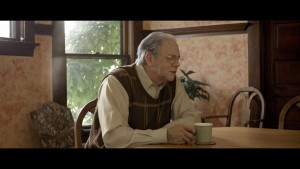 In the fall of 1944, Adolf Eichmann was with a group of high-level SS officers in a Budapest casino discussing the inevitability of Germany losing the war. One of the officers asked Eichmann point blank whether he was worried about what would happen to him when that day finally came. “Eichmann gave a very astute answer that shows he knew how the world worked,” said Nazi
In the fall of 1944, Adolf Eichmann was with a group of high-level SS officers in a Budapest casino discussing the inevitability of Germany losing the war. One of the officers asked Eichmann point blank whether he was worried about what would happen to him when that day finally came. “Eichmann gave a very astute answer that shows he knew how the world worked,” said Nazi  hunter Simon Wiesenthal when recounting this story. “‘A hundred dead people is a catastrophe,’ Eichman answered. ‘Six million dead is a statistic.’”
hunter Simon Wiesenthal when recounting this story. “‘A hundred dead people is a catastrophe,’ Eichman answered. ‘Six million dead is a statistic.’”
The filmmakers understand this, as well, and thus they provide a number of strategically placed 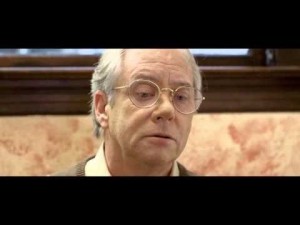 emotional cues in the film in order to make the father’s story both personal and accessible to viewers for whom the Holocaust is just an antiseptic historical fact. But what The Stairs does not address, unfortunately perhaps, is the reason the father chooses to tell his story of survival to an interviewer rather than to his son.
emotional cues in the film in order to make the father’s story both personal and accessible to viewers for whom the Holocaust is just an antiseptic historical fact. But what The Stairs does not address, unfortunately perhaps, is the reason the father chooses to tell his story of survival to an interviewer rather than to his son.
What the father could not, would not share overtly with 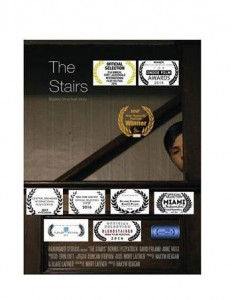 his boy was the guilt that never left him for living when everyone else died. “And that’s how I failed,” he says at the end of his story, describing how he’d picked up his clothes, quickly put them on, and never looked back at the columns of naked Jews being herded like cattle into the gas chambers after one of the guards pulled him out of line at the very last minute. Where others saw in him bravery and endurance, the father saw only cowardice and shame.
his boy was the guilt that never left him for living when everyone else died. “And that’s how I failed,” he says at the end of his story, describing how he’d picked up his clothes, quickly put them on, and never looked back at the columns of naked Jews being herded like cattle into the gas chambers after one of the guards pulled him out of line at the very last minute. Where others saw in him bravery and endurance, the father saw only cowardice and shame.
Today, survivor guilt is an element of post-traumatic stress disorder or PTSD, but it was first recognized by psychologists, psychiatrists and researchers in the early 1960s in Holocaust survivors. The phenomenon expresses more than just the feeling that they don’t deserve to have survived when so many others perished. Survivors are often haunted by actions they took or failed to take in order to survive and can occur in the aftermath of any traumatic situation, including combat, a terrorist attack, a natural disaster, a plane crash or train derailment, or even an epidemic like HIV/AIDS or Ebola. Plagued by his experiences in Auschwitz, Holocaust survivor Primo Levi explored his survivor’s guilt extensively in his autobiographical books, notably in I sommersi e i salvati (The Drowned and the Saved). His death was reportedly a suicide, and towards the end of his life he suffered from depression, possibly induced by his experiences.
Whether it is more about remembering the Holocaust than exploring the universal phenomenon of survivor guilt, The Stairs is definitely one of the films you should make a point of seeing during the running of the 7th Annual Fort Myers Film Festival. The Stairs is an independent film directed by Hakym Reagan and produced by Blake Laitner and Mort Laitner. The cast includes Dennis Fitzpatrick, David Poland, Anne Voxx, Daniel Timothy Treacy, Peter Glazer, Drew Thacher, Elizabeth Zimmerman and Max Albright.
February 9, 2017.

